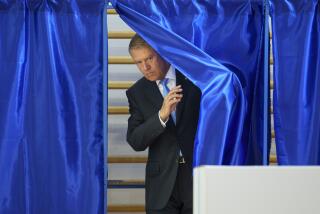Embassy Spies for Arabs, He Says : Romania a ‘Trojan Horse’ in Israel, Defector Asserts
- Share via
WASHINGTON — Romania, the only Communist-ruled country that has maintained full diplomatic relations with Israel for the last 20 years, used its embassy in Tel Aviv as a “Trojan horse” for espionage on behalf of Arab nations and the Palestine Liberation Organization, Romania’s former intelligence chief said Tuesday.
Ion M. Pacepa, who defected to the United States in 1978 after serving as acting head of Bucharest’s Foreign Intelligence Directorate, said his agency “had the task of reporting to Arab leaders” about activities in Israel. He spoke with a small group of journalists over lunch in what were apparently his first public comments since his defection.
Pacepa said that Romania’s decision to maintain diplomatic ties with Israel after all other members of the Soviet-led Warsaw Pact severed relations after the 1967 Arab-Israeli War was based on its desire to obtain information that the East Bloc and Arab nations could not obtain in other ways and to advance Romania’s image of independence from Moscow.
Pacepa said the perception in the West that Romania maintains an arms-length relationship with the Soviet Union is largely the result of an aggressive “disinformation” campaign conducted by the Romanian intelligence service.
He said that Romania created the impression of independence from Moscow because its hard-pressed economy desperately needed American credits and favorable tariff rates for its exports to the United States.
Romania, Poland and China are the only Communist nations that currently enjoy “most favored nation” status with the United States, meaning that their goods can be imported at the same low tariff rates that apply to imports from Western Europe and other friendly countries.
Nevertheless, Pacepa said that Romanian intelligence regularly cooperates with the Soviet KGB, often by obtaining technologically advanced Western equipment. For instance, he said, Romania purchased from a West German middleman a U.S.-developed metal alloy needed for space programs. He said the metal was turned over to the Soviet Union.
“At the time I defected, Romania had more intelligence officers around the world working on Western technology than the Soviet Union (did),” he said. Moscow had about 350 operatives and Bucharest had about 500, he said.
Although Romania is one of the most repressive regimes in the Warsaw Pact in terms of its treatment of its own citizens, Congress has allowed the nation to retain its trade advantages because of a series of high-profile policy differences with Moscow, such as participation in the 1984 Olympics in Los Angeles, a consistently high level of Jewish emigration and the diplomatic relations with Israel.
The Israeli government has long prized its relationship with Bucharest as its only window on the Communist world. An Israeli spokesman declined to comment on Pacepa’s statements. However, it is considered unlikely that Israel would do anything to chill its relationship with Bucharest.
Pacepa, who also served as a personal adviser to Romanian leader Nicolae Ceausescu, said that Romania enjoys cordial relations with all Arab states but that Ceausescu is especially close to Yasser Arafat, chairman of the Palestine Liberation Organization, and Libyan leader Moammar Kadafi.
Concerning Ceausescu and Arafat, Pacepa said, “It was love at first sight starting in 1972.” Kadafi, he said, was considered “a friend with money.”
Pacepa said that Romanian intelligence helped the PLO gather information to “compromise or even assassinate” King Hussein of Jordan in 1975 at a time when the up-and-down relationship between the PLO and Jordan was decidedly cool.
He said there may still be a contingency plan for a PLO assassination of Hussein.
“It did not fail,” Pacepa said of the plot. “It has not taken place. It never had a date.”
Pacepa, who has written a soon-to-be-published memoir, “Red Horizons--Chronicles of a Communist Spy Chief,” said that Ceausescu once ordered installation of 10 million hidden microphones throughout Romania, involving everything from foreign diplomatic missions and visiting Western journalists or businessmen to members of the Romanian Politburo.
He said that ceramic ashtrays and flower vases containing microphones were put in place whenever Westerners were scheduled to visit Romanian hotels or restaurants--ceramic “because you can’t hide a microphone in a crystal ashtray.”
Romanian intelligence eavesdropped on the residence of the U.S. ambassador and on the apartments of other American diplomats in Bucharest but it was never able to penetrate the embassy, Pacepa said. Romanian policy prohibited installing microphones that could not be retrieved in the event of a counterintelligence inspection, he said.
More to Read
Sign up for Essential California
The most important California stories and recommendations in your inbox every morning.
You may occasionally receive promotional content from the Los Angeles Times.












